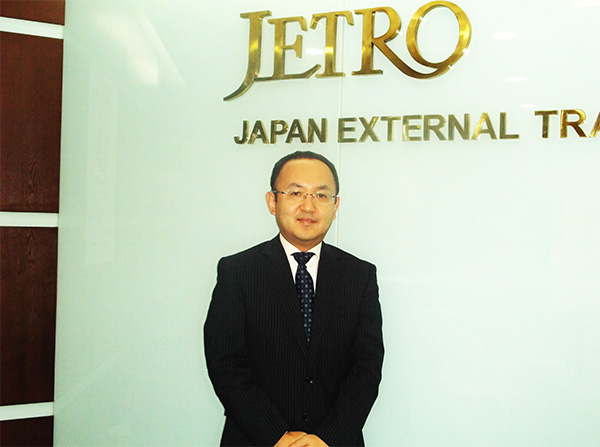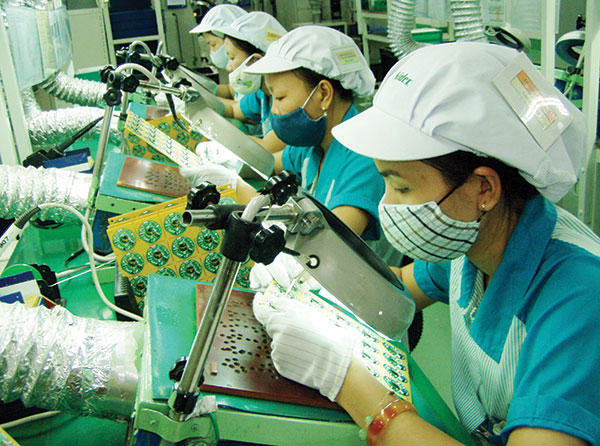Ready for Japan investment wave

Atsusuke Kawada
In 2012, not only was Japan ranked as Vietnam’s second largest trading partner, but also the top source of foreign direct investment (317 projects approved, worth $4,371 million). Until now, Japan has invested heavily in export-oriented and labour-intensive manufacturing industries. However, recently we have seen a considerable number of investment projects in a wider range of fields such as urban development, pharmaceutical manufacturing and high performance and high value added office automation equipment manufacturing; and there is an increasingly obvious trend among Japanese companies to position Vietnam as an important strategic location to be doing business.
In addition, Vietnam along with its central and local governments has been striving to attract Japanese businesses, which has contributed to an increase in investments from Japanese companies. Many of these Japanese companies possess advanced technology and have received enticing “love calls” from the People’s Committees of many provinces that are candidates for Japanese enterprises’ plans for business expansion.
Although it takes a considerable amount of time for Japanese firms to conduct thorough preliminary surveys and make investment decisions, few companies have pulled out once they have decided to invest, and their investments have taken root. Many enterprises, through the process of training Vietnamese staff with a medium to long-term outlook, have grown close to their employees and regard them as family members.

Vietnam is an important investment destination for Japanese investors, Photo: Le Toan
Vietnam- an important investment venue
Obviously Vietnam is an important investment destination for Japanese investors, at a time when Japanese firms are substantially expanding their business in the ASEAN region.
According to a JETRO survey of Japanese companies investing in Vietnam, which was released in December 2012, with regard to business plans for the next 1-2 years, 164 out of 249 companies participating in the survey said they would expand their business (65.9 per cent), meaning two thirds of companies were making specific plans to expand their operations. Furthermore, 80 companies planned to maintain the status quo (32.1 per cent), four companies expected to reduce their business (1.6 per cent), and only one company (0.4 per cent) planned to “move to a third country or withdraw”.
Moreover, Japanese enterprises view the ASEAN bloc as a huge key industrial and consumer market. This is attributed to the fact that the decision to establish the ASEAN Economic Community (AEC) in 2015 will help the implementation of production activities in the region much smoother; and a plan to approach the gigantic consumer market of 600 million people has been realised. At present, it is definitely difficult to say that Vietnam has been fully integrated into the supply chain of multinational corporations in the ASEAN region.
For example, the business operations of many Japanese enterprises that have penetrated Vietnam’s market have remained confined to limited activities specifically related to exports to Japan. However, through the establishment of the AEC and the formation of ASEAN+3 (Japan, China, South Korea) and RCEP (Regional Comprehensive Economic Partnership), it should be easy to recognise Vietnam’s increasingly important role in the structure of the supply chain in the ASEAN region and East Asia. Therefore, Vietnam should concentrate on the following three areas: firstly, developing and upgrading infrastructure, especially the need to improve the business environment in the distribution sector etc.; secondly, industrial development through industrialisation and fostering of support industries; and thirdly, the training of Vietnamese human resources.
Keys to success
At the Japan-Vietnam Economic Forum chaired by the Vietnam Chamber of Commerce and Industry (VCCI), with JETRO and Nikkei BP as co-organisers, held in Hanoi early last month, a panel discussion was held on infrastructure, industrialisation and fostering of supporting industries and training of human resources - three areas in which Japan can contribute to Vietnam’s development.
Regarding the challenges facing Vietnam in these key sectors, the development of infrastructure, the formulation of projects based on co-operation between the public and private sectors (PPT) is essential. In turn, appropriate schemes should be developed so as to be compatible with the characteristics of Vietnam’s market; regarding industrialisation, six sectors should be concentrated on: electronics, seafood processing, agricultural machinery, environment and energy saving, ship building and vehicles and vehicle components; to develop these sectors requires Vietnam’s all-out efforts, which must go beyond the barriers of the presiding ministries. Moreover, in the fostering of support industries, it is important that local enterprises grow; links between local businesses and foreign investors, especially Japanese investors, must be expanded.
Furthermore, I believe that to improve the quality of local products requires the upgrading and expansion of public financial support schemes for machinery purchases, etc. For the development of human resources, the Vietnam-Japan Human Resources Co-operation Centre (VJCC) has put in place programmes directed towards local businesses in Vietnam, for example in business administration, quality control, marketing, human resources management, etc., but it is necessary to implement more programmes that many local businesses can take advantage of.
Improved policies to further attract Japanese firms
More concerted efforts should be made towards the introduction of foreign capital and supplementing policies regarding incentives for investment, such as an exemption or reduction of corporate income tax, based on the consideration of the medium and long-term merits and their impact on the country’s economy. In particular, these measures are extremely important when it comes to attracting high-tech firms.
It is necessary to expand the geographical areas that are considered to be candidates for attracting foreign investment through the upgrade of infrastructure related to distribution such as the road network, harbours, etc. To have more supporting industries it is necessary to strengthen financial regulations for medium and small-sized businesses, and the need for the development of human resources should also be considered.
Regarding the measures related to incentives for investment, Vietnam needs to look at and learn from its neighbour Thailand, and it is expected that Vietnam will put in place similar or more attractive incentives than Thailand.
In addition, based on the results of a survey by JETRO in 2012, we know that among 1,783 Japanese enterprises investing in Vietnam, 1,616 invested in eight major cities and provinces, such as Ho Chi Minh, Hanoi, Danang, Binh Duong, Dong Nai, Hai Phong, Hai Duong and Bac Ninh. Investment by more than 90 per cent of Japanese enterprises has focused on these specific locations. This list of eight major cities and provinces does not include provinces with excellent potential to become an investment destination for Japanese enterprises in the future, for example, Quang Ninh province, which has Ha Long city, in northern Vietnam and the famous tourist destination of Ba Ria-Vung Tau in the south etc.
Additionally, there are provinces that could substantially reduce the travel time to major cities like Hanoi and Ho Chi Minh by improving connectivity through, for example, better road networks. However, currently the situation is such that few Japanese enterprises have entered these provinces.
Given the development of infrastructure through Japan’s official development assistance (ODA) and also funding from the Asian Development Bank, the World Bank, western countries, South Korea, China, etc., we can believe that there are still many hidden investment opportunities for foreign investors, especially Japanese firms.
From JETRO’s side, we will put in our best effort to advance investment in Vietnam by Japanese companies and contribute more to its development, such as implementing programmes aimed at promoting investment into Vietnam from Japan.
Chief Representative, JETRO Hanoi.
What the stars mean:
★ Poor ★ ★ Promising ★★★ Good ★★★★ Very good ★★★★★ Exceptional
Latest News
More News
- Hermes joins Long Thanh cargo terminal development (February 04, 2026 | 15:59)
- SCG enhances production and distribution in Vietnam (February 04, 2026 | 08:00)
- UNIVACCO strengthens Asia expansion with Vietnam facility (February 03, 2026 | 08:00)
- Cai Mep Ha Port project wins approval with $1.95bn investment (February 02, 2026 | 16:17)
- Repositioning Vietnam in Asia’s manufacturing race (February 02, 2026 | 16:00)
- Manufacturing growth remains solid in early 2026 (February 02, 2026 | 15:28)
- Navigating venture capital trends across the continent (February 02, 2026 | 14:00)
- Motivations to achieve high growth (February 02, 2026 | 11:00)
- Capacity and regulations among British areas of expertise in IFCs (February 02, 2026 | 09:09)
- Transition underway in German investment across Vietnam (February 02, 2026 | 08:00)
















 Mobile Version
Mobile Version